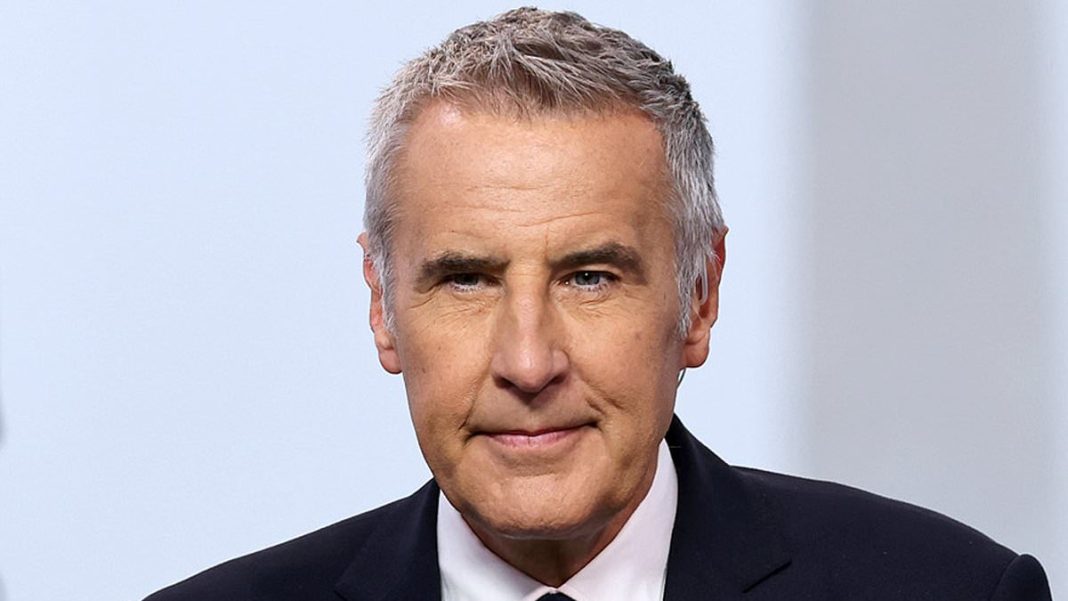Prostate cancer signs you must know – as Dermot Murnaghan urges action,
Dermot Murnaghan has revealed he is battling stage four prostate cancer—and issued a stark warning to other men: get tested before it’s too late.
The 67-year-old, who fronted bulletins on Sky News and the BBC, said he is ‘feeling well’ and responding to treatment—despite a diagnosis that means the cancer has already spread and cannot usually be cured.
In a moving social media post, he said he was ‘blessed’ by the love of his family — and paid tribute to his medical team for their ‘expertise, compassion and sensitivity’.
Murnaghan also issued a direct appeal to men over 50—especially those at high risk or with symptoms—to speak to their GP about getting tested.
His announcement comes amid growing calls for routine NHS screening for prostate cancer, a move campaigners say could save thousands of lives.
‘Needless to say,’ he wrote, ‘my message to all men over 50, in high-risk groups, or displaying symptoms, is: get yourself tested and campaign for routine prostate screening by the NHS.
‘Early detection is crucial. And be aware, this disease can sometimes progress rapidly without obvious symptoms.’
Here, doctors share the signs no man should ignore—and what to do if you’re worried.
The prostate cancer signs that no man should ignore
Because prostate cancer, like other cancers, are best treated in earlier stages, experts say all adult men should be aware of changes that could be a sign of the disease.
Due to the prostate’s location—the gland is situated below the bladder, and wraps around the urethra—it most commonly causes urinary symptoms.
If a man notices these, its important to speak to a GP and discuss whether something called a PSA test might be warranted.
PSA stands for prostate specific antigen, a hormone that’s produced by the prostate in higher amounts if there is a problem with the gland.
One of the most common signs something is wrong with the prostate is a change in urinary frequency.
While the amount people urinate can vary widely—anything between four and ten or so times can be seen as normal—it’s a noticeable increase that experts say men need to be aware of.
Sudden urges—needing to rush to the loo—may also be a sign of a problem.
This could be coupled with difficulty in starting to pee, known medically as hesitancy.
Straining or taking a long time to empty the bladder, a weaker than normal flow and the feeling that the bladder has not fully emptied are also symptoms.
Blood in the urine or semen should also be checked out by a doctor without delay.
These symptoms generally do not mean a man has prostate cancer—more often than not, it could simply be a sign of benign prostate problems that affect more than half of men.
However they should be investigated by a GP and, if a cause cannot be found, a referral to an experienced urologist should be made.
Signs of advanced cancer that may have spread include bone and back pain, a loss of appetite and unexpected weight loss, fatigue and pain in the testicles.
The former was first diagnosed after doctors performed a biopsy after he was experiencing urinary issues. However, while advanced prostate cancer can cause urinary symptoms, it doesn’t always.
In Biden’s case, because the cancer is so aggressive in nature, at stage five, and has already spread to his bones, his treatment options are limited.
While there are medical based treatments such as chemotherapy and hormone therapy available, none of them are curative, doctors say.
What you should if if you’re worried
The NHS states that any man over the age of 50 can request a PSA test from the GP regardless of symptoms.
A PSA test alone can’t diagnose prostate cancer—sexual activity, vigorous exercise, certain medications, urinary infections and benign prostate enlargement, all of which are very common, can raise PSA.
However coupled with symptoms it may warrant an examination of the prostate and possibly further testing.
For more information about prostate health visit Prostate Cancer UK.
If the cancer is caught early, and not causing symptoms, doctors may suggests an active surveillance approach.
Some cases of prostate cancer can be cured in the early stages, with treatment including surgically removing the prostate, and radiotherapy.
If the cancer spread to other parts of the body and cannot be cured, treatment is focused on prolonging life and relieving symptoms.
Earlier this year, Olympic cycling legend Sir Chris Hoy revealed he had been diagnosed with advanced, incurable prostate cancer.
The 48-year-old father-of-two said he was ‘shocked’ by the diagnosis, which came after he experienced no symptoms.
Doctors told him the cancer was already at an advanced stage and had spread to other parts of his body.
Sir Chris’s announcement stunned fans and the sporting world—not least because of his age.
Campaigners say his story highlights the urgent need for a national screening programme, similar to those already in place for breast and bowel cancer, to catch the disease before it becomes harder—or impossible—to treat.
Sir Chris has since thrown his weight behind awareness and fundraising efforts, including a major cycling event planned for September—which Dermot Murnaghan says he’s aiming to join.
It will raise money for cancer charities and challenge public perceptions of what it means to live with stage four cancer.
Prostate cancer is the most common male cancer in the UK, with more than 52,000 men diagnosed each year—and one in eight affected in their lifetime.
In the US, it strikes over 300,000 men annually and is the second leading cause of cancer death among American men, after lung cancer.
Liverpool-based prostate surgeon Mr Marc Lucky said: ‘Any man concerned about their prostate from the age of 45 should be offered a PSA test if they ask for one.
‘It’s important to discuss changes in urinary patterns with the doctor as well as any other reasons for concern.’
PSA test are also available from private doctors and there are home tests available from pharmacists, costing from as little as £30.
‘If a younger man gets an abnormal result it might warrant a referral to an experienced urologist who can carry out an examination and other tests,’ adds Mr Lucky.






